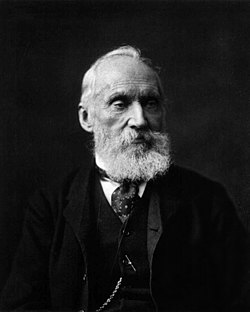Lord Kelvin on the Work of GOD
Author/Compiler: Tihomir Dimitrov (http://nobelists.net; also see http://scigod.com/index.php/sgj/issue/view/3)

LORD KELVIN (1824-1907), founder of Thermodynamics and Energetics
1. Lord Kelvin (Sir William Thomson) closed his presidential address to the British Association for the Advancement of Science (Edinburgh, August 1871) thus:
“Overpoweringly strong proofs of intelligent and benevolent design lie all around us; and if ever perplexities, whether metaphysical or scientific, turn us away from them for a time, they come back upon us with irresistible force, showing to us through Nature the influence of a free will, and teaching us that all living things depend on one ever-acting Creator and Ruler.” (Kelvin 1871; see also Seeger 1985a, 100-101).
2. In his first lecture in the “Introductory Course of Natural Philosophy,” Sir William Thomson stated:
“We feel that the power of investigating the laws established by the Creator for maintaining the harmony and permanence of His works is the noblest privilege which He has granted to our intellectual state. As the depth of our insight into the wonderful works of God increases, the stronger are our feelings of awe and veneration in contemplating them and in endeavoring to approach their Author.” (Kelvin, as cited Seeger 1985a, 99-100).
3. In a speech to University College (1903), Kelvin said: “Do not be afraid to be free thinkers. If you think strongly enough, you will be forced by science to the belief in God.” (Kelvin, as cited in Yahya 2002).
4. “The atheistic idea is so nonsensical that I cannot put it into words.” (Lord Kelvin, Vict. Inst., 124, p. 267, as cited in Bowden 1982, 218).
5. In his address at the annual meeting of the Christian Evidence Society (May 23, 1889), Kelvin said: “I have long felt that there was a general impression in the non-scientific world, that the scientific world believes Science has discovered ways of explaining all the facts of Nature without adopting any definite belief in a Creator. I have never doubted that that impression was utterly groundless.” (Kelvin 1889).
6. “Science can do little positively towards the objects of this society. But it can do something, and that something is vital and fundamental. It is to show that what we see in the world of dead matter and of life around us is not a result of the fortuitous concourse of atoms.” (Kelvin 1889).
- Log in to post comments




Recent comments